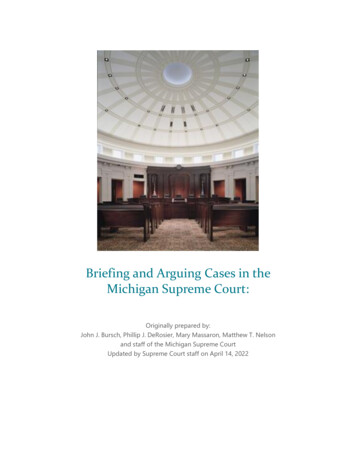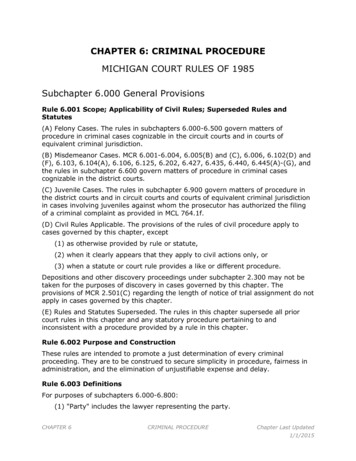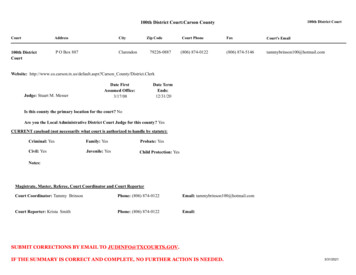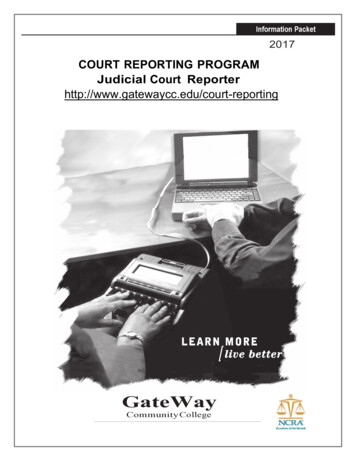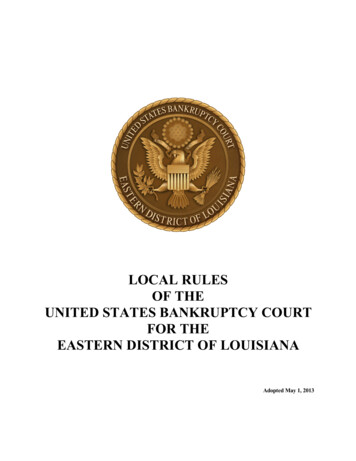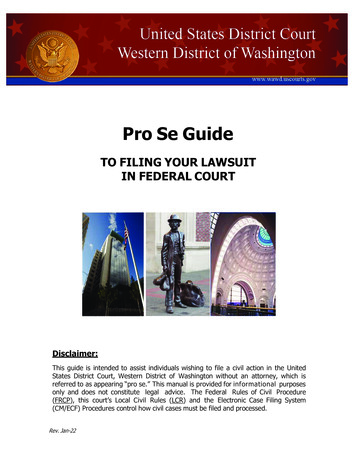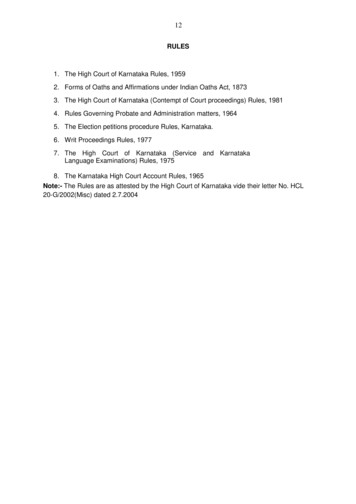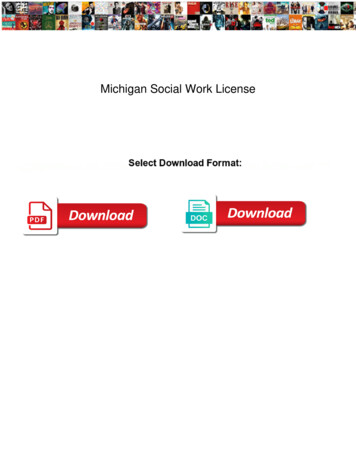
Transcription
CHAPTER 7. APPELLATE RULESMICHIGAN COURT RULES OF 1985Subchapter 7.100 Appeals to Circuit CourtRule 7.101 Procedure Generally(A) Applicability; Scope.(1) This rule applies to appeals to the circuit court from the district court andprobate court, each referred to as "trial court" in MCR 7.101 and 7.103. Theterm "circuit court" includes the Recorder's Court of the City of Detroit as toappeals of which that court has jurisdiction. In appeals from probate court, theterm "clerk" refers to the probate register.(2) An order or judgment of a trial court reviewable in the circuit court may bereviewed only by an appeal.(3) This rule does not restrict or enlarge the right of review provided by law ormake an order or judgment reviewable if it is not otherwise reviewable.(B) Time for Taking Appeal.(1) Appeal of Right. Except when another time is prescribed by statute or courtrule, an appeal of right must be taken within(a) 21 days after the entry of the order or judgment appealed from; or(b) 21 days after the entry of an order denying a motion for new trial orjudgment notwithstanding the verdict, a motion for rehearing orreconsideration, or a motion for other postjudgment relief, if the motionwas filed within the original 21-day period. A motion for rehearing orreconsideration of a motion mentioned in subrule (B)(1)(b) does not extendthe time for filing a claim of appeal, unless the motion for rehearing orreconsideration was itself filed within the 21-day period.A motion for rehearing or reconsideration of a motion mentioned in subrule(B)(1)(b) does not extend the time for filing a claim of appeal, unless themotion for rehearing or reconsideration was itself filed within the 21-day period.(2) Appeal by Leave. When an appeal of right is not available, or the time fortaking an appeal of right has passed, the time for filing an application for leaveto appeal is governed by MCR 7.103.(C) Manner of Taking Appeal; Appeal of Right.(1) Claim of Appeal. To appeal of right, within the time for taking an appeal, anappellant must file a claim of appeal with the circuit court clerk and pay the fee,if required by law. The parties are named in the same order as they appeared inthe trial court, but with the added designation "appellant" or "appellee." Theclaim must state:CHAPTER 7APPELLATE RULESChapter Last Updated9/7/2010
"[Name of aggrieved party] claims an appeal from the [judgment or order]entered [date] in [name of the trial court]."The appellant or the appellant's attorney must date and sign the claim of appealand place his or her business address and telephone number under thesignature.(2) Other Requirements. In addition to doing the acts required by subrule(C)(1), no later than the time the claim of appeal is filed, the appellant must dothe following:(a) File in the trial court copies of the claim of appeal and of the judgmentor order appealed from;(b) File in the trial court a bond for costs on appeal unless the appellant hasfiled a stay bond that includes security for costs or unless the appellant isexempt or excused from filing a bond or bond is waived under MCR3.604(L). This subrule does not, however, apply to civil infraction actions,criminal cases, or summary proceedings for the possession of premises.(i) The bond must be in the amount of 200, unless the trial court setsanother amount.(ii) The bond must have at least one surety, unless the court excusesthis requirement under MCR 3.604(L).(iii) The bond must be on the condition that the appellant will pay thecosts under subrule (O) and the damages under subrule (P) awarded onappeal.(iv) Objections to the bond or surety are governed by MCR 3.604.(c) Deliver or deposit money, property, or documents and do other actsrequired by law.(d) Order in writing a copy of the full transcript and secure payment for it.On the appellant's motion, with notice to the appellee, the trial court mayorder that a lesser portion, or none, of the proceedings be transcribed. Theappellee may file with the trial court a transcript of a portion of theproceedings not filed by the appellant. Except in appeals that the circuitcourt hears de novo, if a transcript of relevant proceedings cannot beobtained, the appellant may initiate procedures for preparation of a settledrecord in the manner provided in MCR 7.210(B)(2).(e) File in the trial court exhibits in the appellant's possession.(3) Notice and Proof of Service. Within 7 days after the claim of appeal is filed,the appellant must serve on the appellee and on any other person entitled byrule or statute to notice of the appeal:(a) a copy of the claim of appeal;(b) a statement specifying(i) when an appeal bond, if any, was filed, the amount of the bond, andthe sureties,CHAPTER 7APPELLATE RULESChapter Last Updated9/7/2010
(ii) when the required fees were paid,(iii) when an act was performed under subrule (C)(2)(c) and the natureof the act;(c) a copy of the reporter's or recorder's certificate showing that(i) the transcript has been ordered and payment secured, with theestimated date of completion,(ii) the transcript has been furnished, or(iii) there is no record to be transcribed.Proof of service, the reporter's or recorder's certificate, and the required statementmust be filed in the trial court and the circuit court.(D) Appellee's Appearance; Cross Appeal.(1) Notice of Appearance. Within 14 days after being served with the claim ofappeal, the required statement, and the reporter's or recorder's certificate, theappellee must file an appearance in the trial court and circuit court and fileexhibits in his or her possession with the trial court clerk.(2) Cross Appeal. The appellee may take a cross appeal by filing a claim ofcross appeal with his or her appearance. The provisions of this rule regardingan appeal govern a cross appeal.(E) Effect of Appeal. The circuit court clerk shall assign a file number to an appealwhen it is filed. The trial court retains jurisdiction until the trial court clerk sendsthe record to the circuit court clerk under subrule (F).(F) Record on Appeal.(1) Within 28 days after filing the claim of appeal, the appellant must file withthe trial court the transcript or a copy of the reporter's or recorder's certificateand a statement that the transcript is not yet available.(2) After the appellant makes the filing under subrule (F)(1), the clerk orregister of the trial court shall(a) ensure that the docket entries are correct and ready for transmittal;(b) ensure that all exhibits have been filed;(c) ensure that all relevant documents and papers from the court file areready for transmittal; and(d) determine that the required fees have been paid and required bondfiled.(3) If the record is ready for transmittal, the court shall sign an ordertransmitting the record. The trial court may eliminate exhibits from the record.(4) If the transcript is not yet available, the trial court shall postponetransmittal of the record, enter an order to facilitate the preparation of therecord, and notify the circuit court of the postponement and of the estimateddate of transmittal.CHAPTER 7APPELLATE RULESChapter Last Updated9/7/2010
(5) The trial court clerk must send the record to the circuit court clerk andnotify the parties of the transmittal.(G) Dismissal of an Appeal. If an appellant does not comply with subrule (C)(2) or(F)(1), the appeal may be considered abandoned, and the trial court may dismissthe appeal on 7 days' notice to the parties, unless the trial court or circuit court hasgranted a motion for further time. The trial court clerk must promptly notify thecircuit court of a dismissal, and the circuit court shall dismiss the claim of appeal.Compliance with subrule (F)(1) after the 28-day period does not preclude dismissalof the appeal unless the appellant shows a reasonable excuse for the latecompliance.(H) Stay of Proceedings.(1) Civil Actions.(a) Unless otherwise provided by rule or ordered by the trial court, anexecution may not issue and proceedings may not be taken to enforce anorder or judgment until the expiration of the time for taking an appealunder subrule (B).(b) An appeal does not stay execution unless(i) the appellant files a stay bond to the opposing party as provided bythis rule or by law; or(ii) the appellant is exempted by law from filing a bond or is excusedfrom filing a bond under MCL 600.2605 or MCR 3.604(L) and the trialcourt grants a stay on motion.(iii) a party appeals a trial court’s denial of the party’s claim ofgovernmental immunity, and the appeal is pending.(c) The stay bond must be set by the trial court in an amount adequate toprotect the opposing party. If the appeal is by a person against whom amoney judgment has been entered, it must be not less than 1 1/4 times theamount of the judgment. The bond must:(i) recite the names and designations of the parties and the judge in thetrial court, identify the parties for whom and against whom judgmentwas entered, and state the amount recovered;(ii) contain the conditions that the appellant(A) will diligently prosecute the appeal to a decision and, if ajudgment is rendered against him or her, will pay the amount of thejudgment, including costs and interest;(B) will pay the amount of the judgment, if any, rendered againsthim or her in the trial court, including costs and interest, if theappeal is dismissed;(C) will pay any costs assessed against him or her in the circuitcourt; andCHAPTER 7APPELLATE RULESChapter Last Updated9/7/2010
(D) will perform any other act prescribed in the statute authorizingappeal; and(iii) be executed by the appellant with one or more sufficient sureties asrequired by MCR 3.604.If the appeal is from a judgment for the possession of land, the bond mustinclude the conditions provided in MCR 4.201(N)(4).(d) Unless otherwise provided in this rule, the filing of a bond stays allfurther proceedings in the trial court under the order or judgment appealedfrom. If an execution has issued, it is suspended by giving notice of thebond to the officer holding the execution.(2) Probate Proceedings.(a) The probate court has continuing jurisdiction to decide other mattersarising out of a proceeding in which an appeal is filed.(b) A stay in an appeal from the probate court is governed by MCL 600.867and MCR 5.802(C).(3) Civil Infractions. An appeal bond and stay in a civil infraction proceeding isgoverned by MCR 4.101(G).(4) Criminal Cases. Unless a bond pending appeal is filed with the trial court, acriminal judgment may be executed immediately even though the time fortaking an appeal has not elapsed. The granting of bond and the amount of itare within the discretion of the trial court, subject to the applicable laws andrules on bonds pending appeals in criminal cases.(5) Request for Stay Filed in Circuit Court. If a request for a stay pendingappeal is filed in the circuit court, the court may condition a stay on the filing ofa new or higher bond than otherwise required by these rules with appropriateconditions and sureties satisfactory to the court.(I) Filing and Service of Briefs.(1) Within 21 days after the trial court clerk notifies the parties that the recordon appeal has been sent to the circuit court, the appellant must file a brief inthe circuit court and serve it on the appellee. The appellee may file and serve areply brief within 21 days after the appellant's brief is served on the appellee.The appellant's brief must comply with MCR 7.212(B) and (C), and theappellee's brief must comply with MCR 7.212(B) and (D).(2) Before the brief is due, a party may withdraw the transcript and exhibits bygiving the clerk a written receipt for them. A party may use them only toprepare the brief and must return them to the clerk when the party is finished.The court may order their return by a specified date.(J) Dismissal for Failure to File Brief. If an appellant does not file a brief within thetime provided by subrule (I)(1) and neither the trial court nor the circuit court hasgranted a motion for further time, the appeal may be considered abandoned, andthe circuit court may dismiss the appeal on 7 days' notice to the parties. The circuitcourt clerk must promptly notify the trial court of a dismissal. Compliance withCHAPTER 7APPELLATE RULESChapter Last Updated9/7/2010
subrule (I)(1) after the 21-day period does not preclude dismissal of the appealunless the appellant shows a reasonable excuse for the late filing.(K) Oral Argument. A party who has filed a timely brief is entitled to oral argumentby writing "ORAL ARGUMENT REQUESTED" in boldface type on the title page of theparty's brief.(L) Setting for Hearing. Within 14 days after the appellee's brief is filed or within 14days after the time for filing it has expired, the circuit court clerk shall(1) schedule the case for argument and notify the parties by mail, if a party hasrequested oral argument; or(2) if no party has requested oral argument, submit the file to the judge towhom the appeal is assigned for decision.(M) Judgment in Circuit Court; Process. After the appeal is decided or dismissed,the circuit court clerk shall promptly send to the trial court clerk a copy of thejudgment, order, or opinion entered in the circuit court and all documentspreviously received from the trial court. The trial court issues further process.(N) Control of Appeal Process.(1) If the trial court postpones transmittal of the record or transmittal isotherwise delayed, the circuit court may on its own initiative exercisesuperintending control over the trial court, the court reporter or recorder, orother personnel to prevent delay.(2) The circuit court may on the appellee's motion or its own initiative issue anorder to show cause why the appeal should not be dismissed. An order to showcause is not required for a dismissal under subrules (G) or (J).(3) A party may obtain interlocutory review of the appellate process by filing amotion in the circuit court under the rules governing motion practice.(4) The circuit court may accelerate the appellate process on a party's motion.(O) Costs. Costs in an appeal to the circuit court may be taxed as provided in MCR2.625. A prevailing party may tax only the reasonable costs incurred in the appeal,including:(1) the cost of an appeal or stay bond;(2) the transcript;(3) documents required for the record on appeal;(4) fees paid to the clerk or to the trial court clerk incident to the appeal;(5) taxable costs allowed by law in appeals to the Supreme Court (MCL600.2441); and(6) other expenses taxable under applicable court rules or statutes.(P) Vexatious Proceedings.(1) The circuit court may, on its own initiative or the motion of a party, dismissan appeal, assess actual and punitive damages, or take other disciplinary actionCHAPTER 7APPELLATE RULESChapter Last Updated9/7/2010
when it determines that an appeal or any of the proceedings in an appeal wasvexatious because(a) the appeal was taken for purposes of hindrance or delay or without anyreasonable basis for belief that there was a meritorious issue to bedetermined on appeal; or(b) a pleading, motion, argument, brief, document, or record filed in thecase or any testimony presented in the case was grossly lacking in therequirements of propriety, violated court rules, or grossly disregarded therequirements of a fair presentation of the issues to the court.(2) Damages may not exceed actual damages and expenses incurred by theopposing party because of the vexatious appeal or proceedings, includingreasonable attorney fees, and punitive damages in an added amount notexceeding actual damages.Rule 7.102 Appeals From Municipal Courts(A) Time for Taking Appeal. To appeal of right from a municipal court, an appellantmust comply with MCR 7.101(B) and (C)(1).(B) Procedure on Appeal. Except when inapplicable because of subrule (C), MCR7.101 governs procedure on appeal.(C) Review in Circuit Court. Review in the circuit court is a retrial of the issues onevidence introduced in the circuit court. Depositions in the trial court may be used.The circuit court may render any judgment or enter any order that should havebeen rendered or entered in the trial court, and may grant other relief as may berequired for the just disposition of the appeal.Rule 7.103 Application for Leave to Appeal(A) Availability. The circuit court may grant leave to appeal from a trial court ormunicipal court when(1) no appeal of right exists, or(2) the time for taking an appeal under MCR 7.101(B)(1) has expired.(B) Procedure.(1) Except when another time is prescribed by statute or court rule, anapplication for leave to appeal must be filed within 21 days after the entry ofthe judgment or order appealed from.(2) The application must state the grounds for the appeal and describe theproceedings in the trial court.(3) A copy of the application must be filed with the trial court and served on theappellee. If service cannot reasonably be accomplished, the appellant may askthe circuit court to prescribe service under MCR 2.107(E).(4) The application must be noticed for hearing in the circuit court at least 14days after its filing. The circuit court may shorten the notice period on ashowing of a need for immediate consideration.CHAPTER 7APPELLATE RULESChapter Last Updated9/7/2010
(5) The circuit court shall consider the merit of the grounds for the appeal andenter an order granting or denying leave to appeal.(6) An application under subrule (A)(2) or an application that is not timelyunder subrule (B)(1), must be accompanied by an affidavit explaining thedelay. The circuit court may consider the length of and the reasons for thedelay in deciding whether to grant the application. A delayed application maynot be filed more than 6 months after entry of the order or judgment on themerits.(C) Leave to Appeal Granted. Immediately after an order granting leave to appeal isentered, the appellant must file a copy with the trial court and serve a copy on theappellee. MCR 7.101 governs further proceedings, except that:(1) the appellant must perform the acts required by MCR 7.101(C) within 7days after the entry of the order granting leave to appeal; however, filing andservice of a claim of appeal are not required;(2) an appellee may file a claim of cross appeal within 14 days after service ofthe order granting leave to appeal; and(3) the appellant must perform the acts required by MCR 7.101(F)(1) within 28days after the entry of the order granting leave to appeal.Rule 7.104 Appeals From Administrative Agencies(A) Appeals Under MCL 600.631. An appeal in the circuit court under MCL 600.631is governed by MCR 7.101 and 7.103, except that the bond requirements do notapply.(B) Appeals Under Michigan Employment Security Act.(1) To obtain review of an order or decision of the Michigan EmploymentSecurity Board of Review, a party must file in the circuit court(a) a claim of appeal within 30 days after the mailing to the party of theboard of review's decision (see MCR 7.101[C][1]); and(b) proof that a copy was served on the board of review and all interestedparties.The board of review is not an appellee. The timely filing of the claim of appealconstitutes the taking of an appeal. Failure to take any further steps to pursue theappeal is governed by MCR 7.101(G), (J), and (N).(2) Within 14 days after service of the claim of appeal, the appellee must file anappearance in the circuit court. A cross appeal may be filed with theappearance. See MCR 7.101(D).(3) Within 42 days after the claim of appeal is served on the board of review orwithin further time the circuit court allows, the board of review must send tothe circuit court clerk a certified copy of the record of proceedings before thereferee and the board of review and notify the parties of the transmittal.(4) The appeal is heard by the circuit court on the certified record. Briefs andoral argument are governed by MCR 7.101(I), (K), and (L).CHAPTER 7APPELLATE RULESChapter Last Updated9/7/2010
(5) Claimants under MCL 421.1 et seq., whose rights to unemploymentcompensation turn on the provisions of that act constitute a class for appeal tothe circuit court under MCL 421.38 and any subsequent appeals. One or moreclaimants who will fairly ensure the adequate representation of all may sue orbe sued on behalf of the class in proceedings under this subrule when thecharacter of the rights sought to be enforced for the class is several, and thereis a common question of law or fact affecting the several rights and a commonrelief is sought. Notice in writing, or other notice as the court directs, must begiven to every member of the proposed class, setting forth the nature of theproposed class action, and clearly and specifically providing an opportunity toeach member of the proposed class to notify in writing the representative thathe or she declines to be included in the class. The declination constitutes areservation of the right to pursue one's own remedies individually and personsso declining may intervene as parties to the suit. MCR 3.501. The judgment inthe suit is binding on all members of the class. An organization representing theclaimants may pay the costs and fees of the proceedings.(C) Appeals From Michigan Civil Service Commission. An appeal from a decision ofthe Michigan Civil Service Commission is governed by the provisions for appealsfrom administrative agencies in the Administrative Procedures Act. MCL 24.201 etseq.(D) Appeals From Michigan Parole Board.(1) Venue. An application for leave to appeal a decision of the parole board maybe filed only in the circuit court of the sentencing county, pursuant to MCL791.234(9). The prosecutor or the victim shall be designated the "appellant"and the prisoner shall be designated the "appellee." The parole board mayintervene as an appellee.(2) Procedure. Except as otherwise provided in this rule, applications for leaveto appeal are governed by MCR 7.103(B).(a) An application for leave to appeal may be filed within 28 days after theparole board mails to the prosecutor and the victim, if the victim hasrequested notification under MCL 780.771, a notice of action granting paroleand a copy of any written opinion. Upon request, the prisoner, theprosecutor, and the victim may receive the parole eligibility report and anyprior parole eligibility reports that are mentioned, and any parole guidelinesthat support the action taken. An order of parole shall not be issued underMCL 791.236 until 28 days after the mailing of the notice of action.(b) A delayed application for leave to appeal may be filed under MCR7.103(B)(6).(c) Timely service of an application for leave to appeal must be made on theparole board and the prisoner. When the victim is appealing, timely serviceof the application also must be made on the prosecutor. When theprosecutor is appealing, timely service of the application also must be madeon the victim, if the victim has requested notification under MCL 780.771.CHAPTER 7APPELLATE RULESChapter Last Updated9/7/2010
(i) The parole board shall be served by sending a copy of the applicationfor leave to appeal and any supporting documents, by registered orcertified mail, return receipt requested, to the parole board's office ofrecord. A copy of the return receipt signed by an agent of the paroleboard must be attached to the proof of service.(ii) The prosecutor shall be served by sending a copy of the applicationfor leave to appeal and any supporting documents, by registered orcertified mail, return receipt requested, to the office of the prosecutingattorney of the sentencing county. A copy of the return receipt signedby an agent of the prosecutor must be attached to the proof of service.(iii) The prisoner shall be served by sending a copy of the application forleave to appeal and any supporting documents, by registered orcertified mail, return receipt requested, to the facility where theprisoner is incarcerated, with instructions to the person in charge of thefacility, or a designee, to personally serve the prisoner. A copy of thereturn of service executed by the appropriate prison official must befiled with the clerk of the court.In addition to the pleadings, service on the prisoner must include anotice, in a form approved by the State Court Administrative Office,advising the prisoner that[A] the prisoner may respond to the application for leave to appealby counsel or in propria persona, although no response is required;and[B] if an order of parole is issued under MCL 791.236 beforecompletion of appellate proceedings, a stay may be granted in themanner provided by MCR 7.105(G), except that no bond is required.(3) Decision to Grant Leave to Appeal.(a) The circuit court shall determine promptly whether to grant leave toappeal.(b) The circuit court must make its determination within 28 days after theapplication for leave to appeal is filed. If the court does not make adetermination within that time, the court shall enter an order to produce theprisoner before the court for a show cause hearing to determine whetherthe prisoner should be released on parole pending disposition of the appeal.(4) Leave to Appeal Granted. If leave to appeal is granted, the appeal isgoverned generally by MCR 7.103, except that(a) no bond is required;(b) the expense of preparing and serving the parole board's evidentiarymaterials for the appeal may be taxed to a non-prevailing appellant, exceptthat expenses may not be taxed to an indigent party;(c) the record on appeal shall consist of the prisoner's central office file atthe Department of Corrections, and any other documents considered by theparole board in reaching its decision. Within 14 days after being served withCHAPTER 7APPELLATE RULESChapter Last Updated9/7/2010
an order granting leave to appeal, the parole board shall send copies of therecord to the circuit court and the other parties; and(d) within 28 days after the parties receive a copy of the record, theappellant must file a brief in the circuit court and serve it on the appellee.The appellee may file and serve a reply brief within 21 days after theappellant's brief is served on the appellee.(5) Burden of Proof. The burden shall be on the appellant to prove that thedecision of the parole board was(a) in violation of the Michigan Constitution, a statute, an administrativerule, or a written agency regulation that is exempted from promulgationpursuant to MCL 24.207, or(b) a clear abuse of discretion.(6) Appeals to the Court of Appeals. An appeal of a circuit court decision is byapplication for leave to appeal to the Court of Appeals pursuant to MCR 7.205.The application shall be filed as an emergency appeal under MCR 7.205(E), andthe Court of Appeals shall expedite its consideration of the matter.(7) Motion to Remand. On timely motion by a party, or on the court's ownmotion, the court may remand the matter to the parole board for anexplanation of its decision. The parole board shall hear and decide the matterwithin 28 days of the date of the order, unless the board determines that anadjournment is necessary to obtain evidence or that there is other good causefor an adjournment. The time to file briefs on appeal under MCR 7.104(D)(4)(d)is tolled while the matter is pending on remand.(8) Parole Board Responsibility After Reversal or Remand. If a decision of theparole board is reversed or remanded, the board shall review the matter andtake action consistent with the circuit court's decision within 28 days. If thecircuit court order requires the board to undertake further review of the file orto reevaluate its prior decision, the board shall provide the parties with anopportunity to be heard. An appeal to the Court of Appeals does not affect theboard's jurisdiction to act under this subsection.Rule 7.105 Appeals From Administrative Agencies in "Contested Cases"(A) Definitions. As used in this rule:(1) "Agency" means a state department, bureau, division, section, board,commission, trustee, authority or officer created by the constitution, statute, oragency action, from whose decision in a contested case an appeal to the circuitcourt is authorized by law. It does not include an agency in the legislative orjudicial branches of government, the Governor, the Bureau of Workmen'sCompensation, the Workers' Compensation Appeal Board, a Michiganemployment security hearing referee, or the Michigan Employment SecurityBoard of Review.(2) "Contested case" means a proceeding including but not limited toratemaking, price fixing, and licensing, in which determination of the legalrights, duties, or privileges of a named party is required by law to be made byCHAPTER 7APPELLATE RULESChapter Last Updated9/7/2010
an agency after an opportunity for an evidentiary hearing. An appeal of oneagency's decision to another agency is a continuous proceeding as thoughbefore a single agency.(3) "Court" means the circuit court.(4) "Decision" means either a final determination, opinion, or order of anagency in a contested case, or a preliminary, procedural, or intermediateagency action or ruling.(B) Scope; Timeliness of Appeal from Decision or Order of Michigan Department ofCorrections Hearing Division(1) This rule governs an appeal to the circuit court from an agency decision in acontested case, except when a statute requires a different procedure. Apetitioner intending to rely on a different procedure permitted by statute shallidentify the statutory procedure in the petition for review. Failure to do sowaives the right to use the different procedure.(2) The court need not dismiss an action incorrectly initiated under some otherrule, if it is timely filed and served as required by this rule and the applicablestatute. Instead, leave may be freely given, when justice requires, to amend anappeal and a response to conform to the requirements of this rule andotherwise proceed under this rule.(3) For purposes of appeal of a final decision or order issued by the hearingsdivision of the Michigan Department of Corrections, if an application for leave toappeal t
Subchapter 7.100 Appeals to Circuit Court . Rule 7.101 Procedure Generally (A) Applicability; Scope. (1) This rule applies to appeals to the circuit court from the district court and probate court, each referred to as "trial court" in MCR 7.101 and 7.103. The term "circuit court" includes the Recorder's Court of the City of Detroit as to
